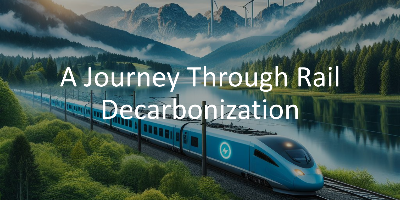4 авг 2021 г. - (EUROPE) European Commission - By 2030, rail freight traffic must increase by 50 per cent
Описание:
Europe is on the brink of the next mobility revolution. Climate-neutral by 2050 – this objective is at the heart of the European Green Deal founded in the European Union’s (EU) commitment to global climate action under the Paris Agreement. The European Commission (EC) clarified that, in order to achieve these rightly, ambitious targets, the greening of freight transportation is of pivotal importance: by 2030, rail freight traffic must increase by 50 per cent, to account for a market share of around 30 per cent. This transition to climate-neutral intelligent logistics is both an urgent challenge and a fascinating opportunity for the rail sector. With road freight transport primarily dependent on fossil fuels, accounting for 76 per cent of the EU’s total inland transportation (in 2019), it is plain that freight logistics is still failing to make sufficient progress to mitigate climate change. By the same token, many countries are facing monumental traffic jams – often caused by countless heavy duty trucks on Europe’s highways – compromising individual transport and undermining the mechanics of predictable supply chains. Forecasts expect freight traffic to grow rapidly in the years to come. But no industrialised nation can afford macro-economic bottlenecks. Nor can mankind afford to postpone climate protection. For near zero greenhouse gas (GHG) emission logistics, there is a proven solution: intermodal rail freight. Undoubtedly, nowadays, rail transportation is making a major comeback, offering excellent services. It transports large quantities of goods safely, rigorously reducing the carbon footprint of supply chains. Especially during the COVID-19 pandemic, rail freight transport impressively demonstrates its resilience and robust functionality. According to a report commissioned by the German Federal Ministry of Transportation, an increase in the modal share of rail in freight transport of one per cent translates into a reduction of CO2 emissions of approximately one million tonnes per year. Digitalisation has the potential to propel the market share of rail freight from around 19 per cent today, to around 30 per cent by 2030, as stipulated by the EC – facilitating a decrease of around 10 million tonnes of CO2 eq. by 2030 in Germany alone. In a nutshell: Only a successful shift to rail decarbonises logistics swiftly and effectively.https://www.globalrailwayreview.com/article/126168/railroad-climate-neutrality-rail-freight/
Добавлено на ленту времени:
Дата:
4 авг 2021 г.
Сейчас
~ 2 гг и 9 мес назад

